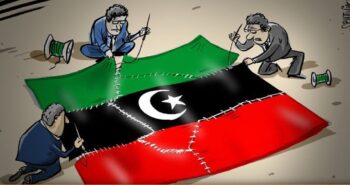Emadeddin Badi

The role of armed groups
Meanwhile, armed groups have entrenched themselves deeper into the infrastructure of Libya’s energy economy. In both east and west, militias have embedded themselves in utilities such as the General Electric Company of Libya (GECOL), where operational choices are influenced more by kleptocratic leverage than by institutional standards.
Between 2022 and 2024, an estimated 1.125 million tons of diesel—allocated theoretically for power generation—were illicitly exported from Benghazi’s old harbor. These exports were facilitated through inflated supply requests issued via GECOL, the obstruction of audits, and threats of violence against oversight bodies. The NOC, too, has been drawn into this vortex.
Crony contracting has allowed politically connected firms to secure procurement deals and operational privileges, eroding the firewall between national resource management and elite patronage.
This dynamic accelerated following the 2022 appointment of Farhat Bengdara as NOC chairman in a power-sharing arrangement between the GNU and eastern authorities. Though intended to ease executive tensions, the move entrenched political influence over the corporation’s operations.
Bengdara’s abrupt resignation in early 2025 did not reverse this trajectory. Instead, his tenure left a lasting imprint: a politicized NOC, increasingly leveraged for factional gain rather than safeguarding Libya’s oil wealth. This erosion of institutional neutrality has a fiscal analog in Libya’s monetary policy, where political imperatives now override sound economic management.
At the core of the dysfunction lies the unchecked expansion of the money supply. Independent estimates suggest that the volume of money in circulation now exceeds 170 billion LYD—a level of liquidity that far outpaces productive output or revenue generation. But the deeper concern lies not in the quantity itself, but in how much of it has been manufactured ex nihilo.
Digital monetary creation—the injection of funds into the economy without any corresponding revenue or production—has become the fallback of a political order unwilling to curb spending or enforce discipline. The predictable result has been a cascading erosion of the LYD’s value, a surge in inflation, and a growing public mistrust in the state’s ability to steward its financial future.
As foreign reserves shrink and black-market rates spike, Libya’s monetary system is no longer a stabilizing force; it is a mirror of its dysfunction.
To call this mismanagement is too generous.
This is structural predation, a system designed both to fail and extract. Public wealth is scarcely channeled into services or national development. It is captured, funneled through kleptocratic networks, and increasingly siphoned through untraceable contracts and offshore accounts.
Addressing this collapse requires more than fiscal prudence. It demands political realignment. Libya’s economic institutions must be recentered as sites of national governance, not tools of factional financing.
The institutions that govern oil revenues, control disbursement, and oversee procurement must be protected, reformed, and in many cases rebuilt, not just with new laws, but with new incentives, protections, and public visibility.
A credible reform strategy must begin with mandatory public disclosure of all oil contracts, real-time publication of state spending, and a ban on off-budget arrangements. Procurement must be regulated through transparent, competitive systems.
Revenue distribution must be guided by transparency, equity, and public oversight—not by decentralization for its own sake, nor by external stewardship.
Reform must strengthen national institutions while ensuring that public funds reach intended sectors and communities through accountable, legally grounded mechanisms. These are not just technocratic ideals. They are prerequisites for legitimacy and recovery.
International actors—donors, multilateral institutions, and diplomatic envoys—must stop treating Libya’s economic collapse as a mere byproduct of its political fragmentation.
Stability manufactured atop corruption is not stability at all.
While much emphasis is placed on unifying the government, doing so without reforming its fiscal architecture would merely centralize corruption under a single executive. That may deliver temporary coherence, but it will not constitute progress. In fact, it risks consolidating the very networks that have driven economic ruin.
Libya does need a single budget and a unified executive—but one subject to strict and enforceable guardrails on how public money is spent, disclosed, and audited. External engagement must support this principle. Anything less only subsidizes the continuation of state capture under a new administrative label.
Libya is not doomed to economic failure. But its current trajectory is unsustainable—not solely because the price of the oil barrel dropped, but because the political will to govern with integrity has long since evaporated.
Recovery will require confrontation, not consensus.
And it must begin with reclaiming the institutions that were designed to serve the public, not those who profit from its decline. Tinkering with technical levers like the exchange rate may buy time. But when such adjustments are used to sustain elite corruption rather than correct structural imbalances, they do not stabilize, they provoke.
If this continues, the next phase of Libya’s crisis will not be quiet erosion. It will be public revolt.
***
Emadeddin Badi is a nonresident senior fellow with the Middle East Programs at the Atlantic Council where he advises on US and European policies toward North Africa and the Sahel, focusing on Libya’s conflict.
_______________________





